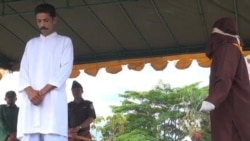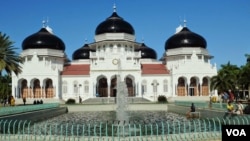Indonesia has the world’s largest Muslim population and a legal system based on Dutch civil law and Indonesian government regulations. But in a 2001 compromise with separatists, Aceh province in Sumatra island’s north was allowed to implement Sharia law.
Since then, religious justice has become increasingly strict – and, for some residents, uncomfortable, at the very least.
In the latest of public whippings in Aceh, a prosecutor on December 5 took a cane to six family members who each received five to eight lashes for playing poker for money at a coffee shop.
Such floggings have significantly increased recently in Aceh province, not only for gambling, but also for drinking alcohol and engaging in relationships deemed illicit. Violators face a choice of caning, jail time or paying a fine in gold.
Sharia police squads target women for immodest dress — such as wearing tight-fitting clothing or not keeping their hair under a scarf. Both women and men can be nabbed for exposing their legs.
Local civil rights advocates, such as Ayu Ningsih, say Sharia law was not wanted nor needed in a place already, as she puts it, "99 percent Islamic."
"Officers enforcing Sharia law wrongly interpret it," she says. "Women end up being the primary targets."
Restrictions and punishments increased
Aceh’s legislature in late September approved harsher penalties for an expanded list of offenses, including extramarital and gay sex. And the province’s lawmakers also voted to apply Sharia law to Aceh’s 90,000 non-Muslims, including foreigners.
That has led to fears that if the province’s governor signs off on the law, Catholics, for example, will no longer be able to properly celebrate Mass because Holy Communion involves sipping sacramental wine.
"I think they have the right to celebrate Communion or whatever they want," said Yusny Saby, a professor at State Islamic University. "But, of course, in their own premise – no problem in the church, in the house, but not on the street. Simply, this will provoke."
Non-Muslims chafe
It is not only Christians who have felt increasingly threatened in Aceh. The province’s previous governor, in 2011, declared that several non-Sunni Muslim sects were following what he termed "deviant teachings."
"Different groups, different factions, different schools and so on. They are there. But, of course, we don’t want to have a kind of conflict," Saby said, calling for communication. "I think the present governor is aware of this kind of tension."
There is also concern the increasing fundamentalism will attract militants to a region that has seen past Islamic insurgencies.
That could deter investment for a province rich in resources, such as offshore oil and gas, mining, coffee and rubber – not to mention pristine Sumatran beaches that have ample room for many more tourists.







